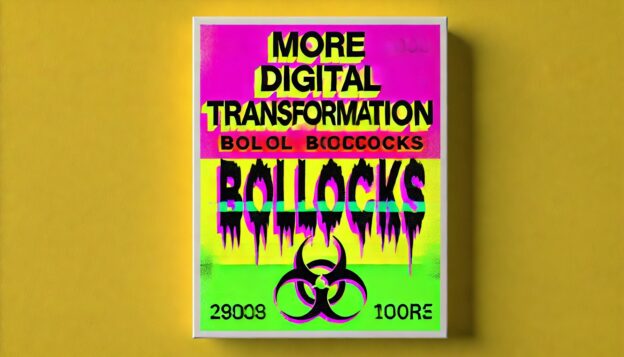“Digital transformation” is the corporate catchphrase of the decade, hailed as the key to unlocking innovation, agility, and competitiveness. From boardrooms to tech conferences, companies proudly proclaim their digital transformation journeys, often without a clear understanding of what the term actually means.
So let’s cut through the jargon and expose the bollocks surrounding digital transformation in the twenty-fourth article in my satirical comedic polemic series aim to explore behind the buzzword where lies a reality filled with vague strategies, unrealistic expectations, and a lot of wasted money.
“Every Business Must Digitally Transform or Die”
The idea that businesses must embrace digital transformation to survive has become a mantra in corporate circles. While adapting to new technologies is important, the notion that every business needs to undergo a sweeping, all-encompassing transformation is misguided.
Digital transformation often gets conflated with adopting the latest tech trends, even when those trends don’t align with a company’s goals or industry needs. A local bakery doesn’t need blockchain, and a small retailer won’t necessarily benefit from AI-driven customer analytics. The claim that all businesses must digitally transform or perish is overhyped bollocks.
“Digital Transformation is About Technology”
Many organisations treat digital transformation as a shopping spree for the latest tech, cloud computing, AI, IoT, you name it. But real transformation isn’t about technology; it’s about using technology to drive meaningful changes in how a business operates, serves its customers, and achieves its goals.
Investing in new tools without addressing cultural, organisational, or process challenges often leads to expensive failures. The narrative that digital transformation is purely a tech upgrade? Pure bollocks.
“We’re 100% Digitally Transformed”
Digital transformation is often presented as a finish line, a goal that, once achieved, positions a company for perpetual success. But in reality, transformation is a continuous process of adaptation and improvement. The pace of technological change means there’s no such thing as being “fully transformed.”
Companies that claim to have completed their digital transformation are usually engaging in PR spin rather than reflecting operational reality. The idea of being “100% digitally transformed” is self-congratulatory bollocks.
“AI and Automation Will Do All the Work”
A major selling point of digital transformation is the promise of automation and AI reducing costs and streamlining operations. While these tools can be powerful, they’re not magic solutions. Implementing them effectively requires clear goals, skilled teams, and ongoing oversight.
Poorly implemented AI can lead to biased decision-making, while automation without proper planning can result in inefficiencies and frustrated employees. The promise that AI and automation will seamlessly handle everything is exaggerated bollocks.
“It’s All About the Customer Experience”
Digital transformation is often framed as a way to revolutionise the customer experience, with claims of personalised journeys, 24/7 engagement, and frictionless interactions. While these are worthwhile goals, many companies implement flashy tech solutions without addressing the underlying issues customers face.
A chatbot won’t help if your product is subpar, and a slick mobile app can’t compensate for poor customer service. The idea that technology alone will fix the customer experience is short-sighted bollocks.
“We Need a Digital Transformation Officer”
The rise of roles like Chief Digital Officer (CDO) reflects the growing emphasis on digital transformation, but too often, these positions are created as symbolic gestures rather than meaningful drivers of change. A lone executive can’t singlehandedly transform an organisation without buy-in from other leaders and alignment across teams.
Creating a role for the sake of appearances, rather than empowering it with the authority and resources to drive real change, is more corporate bollocks than strategy.
“Digital Transformation Saves Money”
One of the most common claims is that digital transformation will lead to cost savings through efficiencies and streamlined operations. While this can be true in the long run, the upfront costs of implementing new technologies, retraining staff, and redesigning processes are often significant.
Many companies underestimate the resources needed for successful transformation, leading to budget overruns and disappointing results. The narrative that digital transformation is a cost-cutting measure is simplistic bollocks.
“Data is the New Oil”
This popular analogy suggests that data is the most valuable asset a company can have, driving the need for digital transformation to harness its potential. But like oil, raw data is only valuable if refined into actionable insights, and not all businesses are equipped to do so effectively.
The explosion of data often leads to analysis paralysis, where companies collect mountains of information without knowing how to use it. The idea that data alone guarantees success is another piece of transformation bollocks.
“Digital Transformation Happens Overnight”
Many businesses approach digital transformation as a quick fix, expecting immediate results. But true transformation requires time, cultural shifts, and iterative improvements. Rushing the process often leads to superficial changes that fail to deliver lasting value.
The promise of instant transformation is one of the most misleading pieces of digital bollocks out there. It’s a marathon, not a sprint.
“Digital Transformation is an IT Department Project”
Some companies treat digital transformation as the sole responsibility of the IT department, relegating it to tech specialists rather than embedding it across the organisation. But successful transformation requires collaboration between IT, leadership, operations, and customer-facing teams.
Viewing digital transformation as an IT-only initiative is a recipe for failure, and classic bollocks thinking.
Conclusion: Transformation Without the Bollocks
Digital transformation has the potential to drive innovation, improve efficiency, and create better customer experiences. But the buzzword has been hijacked by marketing, leading to inflated expectations and misguided strategies. True transformation isn’t about chasing trends or ticking boxes, it’s about aligning technology with organisational goals and culture.
The next time you hear someone talking about “digital transformation” take a step back and ask what they really mean. Because behind the jargon and the PowerPoint slides, much of what’s being sold as transformation is, quite simply, bollocks.
